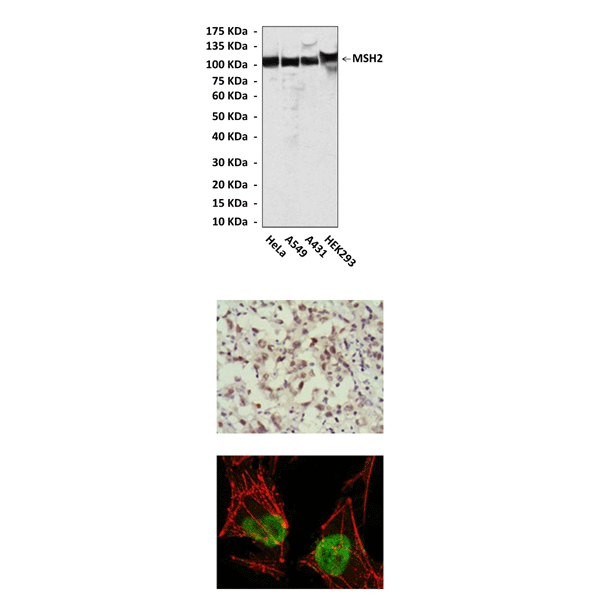Anti-MSH2: Mouse MutS Homolog 2 Antibody |
 |
BACKGROUND The mismatch repair (MMR) proteins are required to maintain genomic integrity in prokaryotes and eukaryotes, by correcting single mismatches and short unpaired regions, such as small insertions and deletions. In eukaryotes, three proteins are involved in mismatch recognition, MSH2, MSH3 and MSH6. The three proteins form two heterodimers MutSalpha (MSH2-MSH6) and MutSbeta (MSH2-MSH3). MutSalpha is thought to be involved primarily in the recognition and repair of base-base mismatches and small insertion/deletion loops. MutSbeta acts preferentially on insertion/deletion loops up to 12 nucleotides in length. MMR is tightly linked with the mismatch-binding-dependent ATPase activities of the MSH. Upon binding to the mismatch, heterodimers bend the DNA helix and shields approximately 20 base pairs. After mismatch binding, MutS alpha or beta forms a ternary complex with the MutL alpha heterodimer, which is thought to be responsible for directing the downstream MMR events, including strand discrimination, excision, and resynthesis.1 ATP binding and hydrolysis play a pivotal role in mismatch repair functions. The ATPase activity associated with MutS alpha regulates binding similar to a molecular switch: mismatched DNA provokes ADP-->ATP exchange, resulting in a discernible conformational transition that converts MutS alpha into a sliding clamp capable of hydrolysis-independent diffusion along the DNA backbone. This transition is crucial for mismatch repair. The MSH2, MSH3, and PMS2 mismatch repair proteins are also involved in other DNA repair pathways such as single-strand annealing and homologous recombination, anti-recombination, DNA damage signaling, apoptosis, as well as site-specific mutagenesis during immunoglobin somatic hypermutation and class switch recombination. In addition, in melanocytes MSH2 may modulate both UV-B-induced cell cycle regulation and apoptosis.2 MSH2 mutation is a commonly associated with Hereditary nonpolyposis colorectal cancer. It is also associated with some endometrial cancers.3
REFERENCES
1. Kolodner, R.D. & Marsischky,G.T.: Curr. Opin. Genet. Dev. 9:89-96, 1999
2. Rich, T. et al: Nature 407:777-83, 20000
3. Vasen, H.F.A. et al: J. Clin. Oncol. 19:4074-80, 2001
2. Rich, T. et al: Nature 407:777-83, 20000
3. Vasen, H.F.A. et al: J. Clin. Oncol. 19:4074-80, 2001
Products are for research use only. They are not intended for human, animal, or diagnostic applications.
Параметры
Cat.No.: | CP10173 |
Antigen: | Purified recombinant human MSH2 fragments expressed in E. coli. |
Isotype: | Mouse IgG1 |
Species & predicted species cross- reactivity ( ): | Human, Monkey |
Applications & Suggested starting dilutions:* | WB 1:1000 IP n/d IHC 1:200 ICC 1:200 FACS n/d |
Predicted Molecular Weight of protein: | 104 kDa |
Specificity/Sensitivity: | Detects endogenous MSH2 proteins without cross-reactivity with other family members. |
Storage: | Store at -20°C, 4°C for frequent use. Avoid repeated freeze-thaw cycles. |
*Optimal working dilutions must be determined by end user.
Документы
Информация представлена исключительно в ознакомительных целях и ни при каких условиях не является публичной офертой








